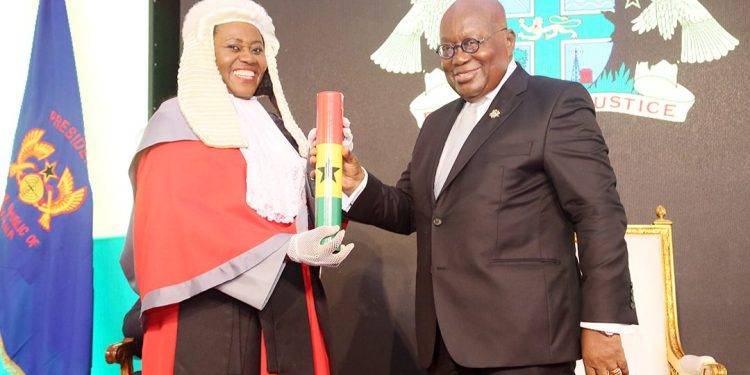Professor Stephen Kwaku Asare, a concerned Ghanaian citizen, has formally petitioned President Nana Addo Dankwa Akufo-Addo for the removal of Chief Justice Gertrude Torkornoo, citing allegations of misbehavior and incompetence in her administrative duties. The petition, submitted on December 17, hinges on Article 146 (1) of Ghana’s 1992 Constitution, which provides the legal framework for removing a Justice of the Superior Court or a Regional Tribunal Chairperson for stated misbehavior, incompetence, or inability to perform their functions.
In his detailed petition, Prof. Asare clarified that his grievances are rooted in the Chief Justice’s administrative actions rather than her judicial rulings. He emphasized that the allegations do not challenge any decisions, orders, or directives issued by Justice Torkornoo in her capacity as a Supreme Court judge. Instead, the concerns focus on her supervisory role as the head of Ghana’s judiciary, as stipulated in Article 125 (4) of the Constitution.
Key Allegations in the Petition
Prof. Asare outlined several issues that he believes undermine the judiciary's independence and impartiality under the Chief Justice’s leadership. One major contention involves her alleged manipulation of judicial appointments. The petitioner accused her of orchestrating an elaborate scheme in which she proposes specific judges for presidential nomination and subsequently presents the same names to the Judicial Council for approval. According to him, this process effectively reduces both the president and the council to mere rubber stamps for her preferred choices.
“When the petition is being considered at any stage, members of the Judicial Council will be subpoenaed to testify on the matter,†the petitioner noted, signaling his determination to substantiate his claims with testimony from key stakeholders.
Another significant allegation involves the Chief Justice’s reported interference with judicial panels. Prof. Asare claims that she has reconstituted duly constituted panels without offering any public interest justification or reasonable explanation for her actions.
“We consider the reconstitution of panels to be beyond the Chief Justice’s administrative power. Such actions amount to direct interference with the impartiality and independence of duly constituted judicial panels,†the petition stated.
These alleged interferences, according to the petitioner, violate the constitutional principles that ensure the judiciary operates independently and without undue influence.
Constitutional Basis and Procedure
Article 146 (1) of Ghana’s Constitution establishes the grounds and procedure for removing a Justice of the Superior Court. It stipulates that such removal can only occur based on stated misbehavior, incompetence, or an inability to perform the functions of the office due to physical or mental infirmity.
Prof. Asare’s petition invokes this constitutional provision, arguing that the Chief Justice’s administrative conduct meets the threshold for a formal investigation and potential removal from office. He expressed confidence that his petition aligns with the constitutional framework and is aimed at safeguarding the integrity of Ghana’s judiciary.
The petitioner also took care to delineate the scope of his grievances, clarifying that his concerns do not extend to the Chief Justice’s judicial decisions. “The petition does not challenge any decisions, orders, or directives issued by the Chief Justice in her adjudicative capacity. Instead, it focuses solely on her administrative actions as the head of the judiciary,†he explained.
Implications of the Petition
The call for the Chief Justice’s removal has sparked discussions about judicial accountability and the balance of power within Ghana’s democratic framework. While the petition raises serious concerns about the judiciary's leadership, it also underscores the importance of adhering to due process in addressing such allegations.
If the president decides to act on the petition, the next step would involve appointing a committee to investigate the allegations. This process would require careful scrutiny of the evidence presented and testimonies from relevant parties, including members of the Judicial Council.
The petition also highlights broader issues regarding the judiciary’s role in ensuring transparency and accountability in governance. Critics argue that any perceived manipulation of judicial appointments or interference with panels could erode public trust in the judiciary and weaken its ability to act as an impartial arbiter of justice.
Public Reactions
The petition has elicited mixed reactions from legal experts, political commentators, and the general public. While some view it as a necessary step to uphold judicial integrity, others see it as a politically motivated attempt to discredit the Chief Justice.
As the debate unfolds, attention will focus on how the president and the relevant authorities respond to the petition. The outcome of this case could have far-reaching implications for the judiciary’s credibility and the broader democratic landscape in Ghana.
For now, the petition serves as a stark reminder of the delicate balance between judicial independence and accountability in a constitutional democracy. Whether these allegations will result in concrete action against the Chief Justice remains to be seen, but the case has undoubtedly added a new dimension to discussions about governance and the rule of law in Ghana.



